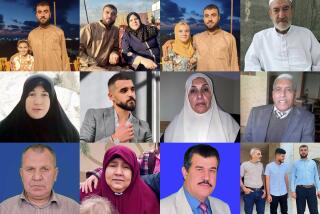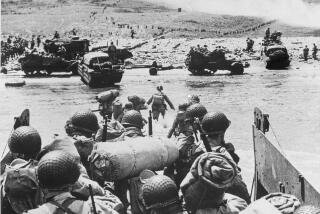Bitterness Persists Over French Civilians Killed by Allies
- Share via
CAEN, France — As D-day crowds remem ber fallen soldiers, bitter survivors gather at the 14,000 scattered and forgotten graves of civilians sacrificed in the name of the liberation.
Most of them were victims of the “Transportation Plan,” an essentially fruitless Allied effort to slow German reinforcements by bombing Norman cities and crossroads into heaps of rubble.
People expecting deliverance watched in shock as explosives leveled urban centers that Resistance agents had reported were free of enemy concentrations.
“They aimed not to kill Germans but to cut the roads, which the French knew was impossible,” said Jean Quellien, a historian who studied civilian casualties. “Everyone wondered: ‘Why?’ ”
Because inaccurate bombing was worsened by bad weather and antiaircraft fire, far more people died from the air raids than from the cross-fire of battle, he added.
Air attacks on German troop columns did slow some movement to the front, but the attempt to block roads and blow up bridges did little more than devastate towns and kill civilians.
At the time, anger blunted the joy of D-day. Franz Gockel, a young German soldier fleeing Omaha Beach with a wounded hand, recalled his surprise when he was cornered by French civilians.
“I expected them to tear me apart,” he said. “One man pulled out a dagger, but he pointed it to the sky. ‘This is for the Americans,’ he told me.”
Few dared to criticize the Allies amid the euphoria of gratitude of people who did not directly suffer. Later, as France rebuilt at a furious pace, the past was pushed aside.
Only now, 50 years later, are the French talking out loud about repressed emotions. So long after the fact, the anger has settled into a gnawing bitterness, a frustration that no one knows or cares.
“We were forgotten, left to our own devices,” said Frederique Legrand, an infant when Allied bombers missed the bridge at Caen but killed her parents. Thousands died as the city was leveled.
Orphanages were so jammed, and other costs were so pressing, that France did not get around to recognizing Legrand as a ward of the state until she was 21. That amounted only to a piece of paper.
“Relatives helped raise me and my sister and brother. But we were different from other kids,” she said. “No one seemed to know what Normandy suffered.”
Pierre Poupard, who watched his hometown of St. Lo crumble around him, has located 1,100 survivors of the firestorm for a solemn weekend reunion in the rebuilt city.
“We don’t blame the Allies,” he said. “They freed us from the tyranny of occupation.” But, he added, it was a terrible cost and he wished more people realized the price paid.
The Transportation Plan was debated hotly before D-day. Winston Churchill opposed it, fearful of killing civilians and devastating old monuments. Senior air commanders wanted to keep bombing Germany.
Others insisted that since bombing had disrupted rail traffic, it could do the same with roads by collapsing cities and villages onto crucial highways. Gen. Dwight D. Eisenhower, the commander, agreed.
“No one ever taught this in school,” said Christophe Bauduffe, a journalist whose book, “The Sacrifice of the Normans,” details the countless scenes of human misery. “Now, it is coming out.”
“People are finally speaking out, releasing these pent-up feelings,” said Quellien, the historian.
“Anger is not the word. But for those who lost a mother, a sister, a father, June 6 is no day of celebration.”
More to Read
Sign up for Essential California
The most important California stories and recommendations in your inbox every morning.
You may occasionally receive promotional content from the Los Angeles Times.












